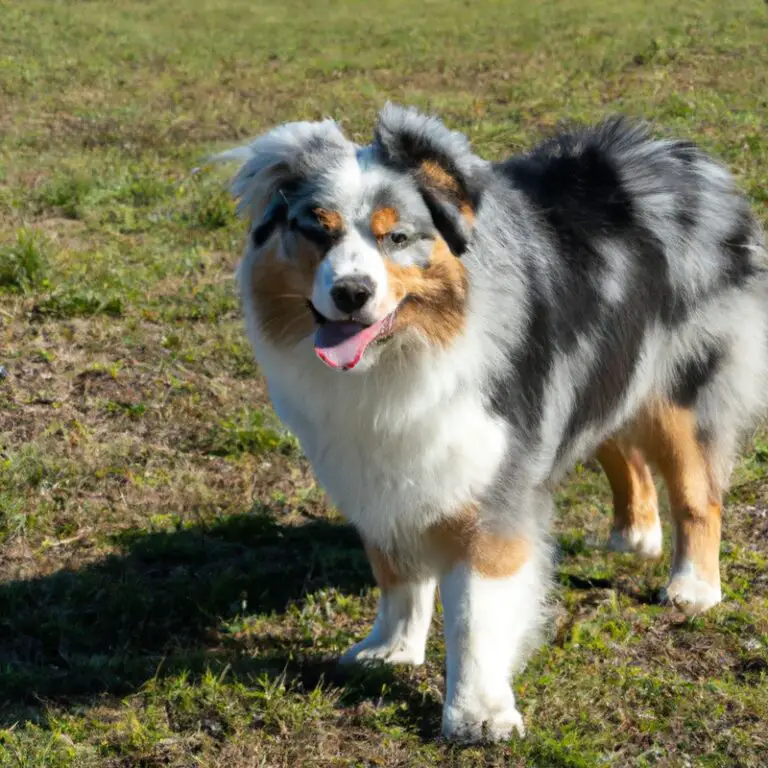What Kind Of Diet Should I Provide For My Australian Shepherd?
Key Takeaways:
- Australian Shepherds thrive on a well-balanced, high-quality diet rich in protein.
- It is important to feed your Australian Shepherd a diet that is appropriate for their age, size, and activity level.
- Avoid feeding your Australian Shepherd table scraps or excessive treats to prevent weight gain and promote overall health.
- Regularly consult with a veterinarian to ensure that your Australian Shepherd’s dietary needs are being met.
Are you wondering what kind of diet will keep your beloved Australian Shepherd healthy and thriving? Well, look no further! As an expert in pet nutrition, I’m here to guide you through the intricacies of feeding your Australian Shepherd.
We’ll delve into understanding their unique nutritional needs, the essential components of their diet, and even discuss how to design a balanced meal plan just for them.
Plus, I’ll reveal some foods you should avoid and provide you with helpful feeding guidelines and tips. Get ready to nourish your Aussie with the best possible diet – let’s dive in!
| Pros | Cons | |
| Commercial Dog Food | Convenient and easy to feed | May contain questionable ingredients |
| Raw Food Diet | Provides natural nutrients | May lead to nutritional imbalances |
| Home-Cooked Diet | Control over ingredients | Requires time and effort for preparation |
| Combination Diet | Offers a balance between convenience and nutrition | Requires careful planning and monitoring |
Understanding the Nutritional Needs of Australian Shepherds
Factors Influencing Australian Shepherd’s Diet
Several factors influence the diet of Australian Shepherds. One of the key factors is their age.
Puppies have different nutritional needs compared to adult or senior dogs.
Their diet should include higher levels of protein and fat to support their growth and development. Another factor is the activity level of the dog.
Australian Shepherds are highly energetic and require a diet that provides them with enough energy to fuel their daily activities.
Active dogs may need more calories and nutrients compared to less active dogs. The size and weight of the Australian Shepherd also play a role in their diet.
Smaller dogs may require fewer calories, while larger dogs may need more.
It’s important to adjust the portion sizes accordingly to maintain a healthy weight. Health conditions and any specific dietary restrictions or allergies also influence their diet.
Some Australian Shepherds may have food allergies or sensitivities, which require avoiding certain ingredients.
Additionally, dogs with specific health conditions may require a specialized diet to manage their condition. Lastly, the individual preferences and taste preferences of the dog can also affect their diet.
Some Australian Shepherds may be picky eaters, while others may have specific food preferences.
It’s important to find a diet that they enjoy and meets their nutritional needs. Considering these factors, it’s essential to choose a diet that is suitable for an Australian Shepherd’s age, activity level, size, health conditions, and preferences.
Consulting with a veterinarian can be helpful in determining the most appropriate diet for your Australian Shepherd based on these factors.

Determining Energy Requirements
Determining the energy requirements of your Australian Shepherd is essential for providing them with a balanced and healthy diet. The energy needs of your dog depend on various factors such as age, weight, activity level, and overall health.
To determine the energy requirements, you can use a formula called Resting Energy Requirement (RER).
The RER is calculated by multiplying the dog’s body weight in kilograms by 30 and then adding 70. This formula provides an estimate of the calories needed for your dog at rest.
However, keep in mind that this is just a starting point and may need to be adjusted based on your dog’s specific needs.
Another way to determine your Australian Shepherd’s energy requirements is by considering their activity level. If your dog is highly active, such as participating in dog sports or regular exercise, they will require more calories to fuel their energy expenditure.
On the other hand, if your dog has a sedentary lifestyle, they may need fewer calories.
It’s important to monitor your Australian Shepherd’s weight and adjust their diet accordingly. If your dog is gaining weight, you may need to decrease their calorie intake, and if they are losing weight or appear to be too thin, you may need to increase their calorie intake.
Remember to consult with your veterinarian to get a better understanding of your Australian Shepherd’s specific energy requirements.
They can provide guidance and help you create a diet plan that meets your dog’s individual needs.
Importance of Balanced Nutrition
Balanced nutrition is essential for the overall health and well-being of your Australian Shepherd. It provides the necessary nutrients, vitamins, and minerals that support their growth, development, and immune system.
A balanced diet ensures that your dog receives the right amount of proteins, healthy fats, complex carbohydrates, and vitamins and minerals to meet their specific needs.
When your Australian Shepherd receives balanced nutrition, it helps maintain a healthy weight, promotes strong bones and muscles, and supports their digestive and immune systems. It also contributes to a shiny coat, healthy skin, and optimal cognitive function.
A balanced diet plays a crucial role in preventing certain health issues such as obesity, allergies, and nutrient deficiencies.
By giving your Australian Shepherd the right mix of nutrients, you can help them live a long, healthy, and active life. To ensure your Australian Shepherd gets a balanced diet, incorporate high-quality protein sources like lean meats, fish, and poultry.
Healthy fats such as omega-3 fatty acids from sources like fish oil provide essential nutrients for their skin and coat.
Complex carbohydrates from sources like whole grains and vegetables provide energy and fiber. It is also important to provide adequate vitamins and minerals through their diet.
This can be achieved by feeding a variety of fruits, vegetables, and supplements if necessary.
Remember to make sure your Australian Shepherd has access to fresh, clean water at all times to stay properly hydrated.

Essential Components of an Australian Shepherd’s Diet
High-Quality Protein Sources
When it comes to the diet of your Australian Shepherd, high-quality protein sources are crucial. Proteins play a vital role in your dog’s overall health and well-being.
They provide the building blocks for muscle development, repair, and maintenance.
Look for protein sources such as chicken, beef, fish, and eggs. These foods are not only rich in protein but also contain essential amino acids that are necessary for your Australian Shepherd’s optimal growth and development.
Remember to choose lean cuts of meat and ensure proper cooking to avoid any potential health risks.

Healthy Fat Content
Healthy fat content is a crucial component of an Australian Shepherd’s diet. Adequate amounts of healthy fats are necessary for their overall health and well-being.
Healthy fats provide energy, aid in nutrient absorption, support a healthy coat and skin, and promote brain function.
Good sources of healthy fats for Australian Shepherds include fish oil, flaxseed oil, and coconut oil. Incorporating these healthy fats into their diet can help keep them happy and healthy.
Remember to consult with a veterinarian to determine the appropriate amount of healthy fats for your Australian Shepherd.
Complex Carbohydrates
Complex carbohydrates are an essential component of an Australian Shepherd’s diet. These carbohydrates provide a steady source of energy for your dog throughout the day.
They are found in foods such as whole grains, vegetables, and legumes.
Complex carbohydrates are beneficial because they digest slowly, preventing spikes in blood sugar levels. They also provide important nutrients like fiber and vitamins.
Incorporating complex carbohydrates into your Australian Shepherd’s diet will help support their overall health and well-being.
Adequate Vitamins and Minerals
Adequate vitamins and minerals are essential for the overall health and well-being of your Australian Shepherd. These nutrients play a crucial role in supporting various bodily functions, such as immune system function, bone health, and energy production.
To ensure your Australian Shepherd receives adequate vitamins and minerals, it is important to provide a balanced and nutritious diet.
Incorporating a variety of vegetables and fruits into their meals can help provide a range of vitamins and minerals. Examples include carrots for vitamin A, broccoli for vitamin C, and spinach for iron.
Additionally, certain minerals like calcium and phosphorus are important for strong bones and teeth.
You can meet these mineral requirements by including sources such as yogurt, cheese, and fish in their diet. While a well-rounded diet is typically sufficient in providing essential vitamins and minerals, some pet owners may opt to supplement their Australian Shepherd’s diet with vitamins and minerals specifically formulated for dogs.
However, it is important to consult with a veterinarian before introducing any supplements to ensure they are appropriate for your dog’s individual needs.
Importance of Hydration
Hydration is incredibly important for Australian Shepherds (and all dogs, for that matter). Making sure your furry friend gets enough water is crucial for their overall health and well-being.
Proper hydration helps regulate body temperature, aids digestion, and supports vital organ function.
It also helps prevent urinary tract infections and kidney disease. Dehydration can lead to serious health issues and should be avoided at all costs.
Always provide fresh, clean water for your Australian Shepherd, and make sure it is easily accessible throughout the day.
Monitor their water intake, especially during hot weather and after exercise. Encourage them to drink by placing multiple water bowls around the house or using a fountain-style water dispenser.
If you notice signs of dehydration, such as lethargy, dry mouth, sunken eyes, or loss of skin elasticity, contact your veterinarian immediately.
They can provide guidance on how to rehydrate your dog and prevent further complications. Remember, keeping your Australian Shepherd properly hydrated is a simple yet important way to promote their overall health and ensure they stay happy and active.
So, always keep that water bowl filled!
Designing a Balanced Diet for an Australian Shepherd
Following a Breed-Specific Diet
Following a breed-specific diet is essential for the health and well-being of your Australian Shepherd. This means providing them with a diet that meets their specific nutritional needs based on their breed characteristics and activity level.
Australian Shepherds are energetic and active dogs, so their diet should be tailored to support their high energy levels.
To follow a breed-specific diet for an Australian Shepherd, it is important to focus on the essential components of their diet. This includes incorporating high-quality protein sources such as lean meats, poultry, and fish.
These protein sources help to build and maintain muscle mass in your Australian Shepherd.
Healthy fat content is another crucial aspect of their diet, as it provides a concentrated source of energy. You can include healthy fats from sources like salmon, flaxseed, and coconut oil.
Complex carbohydrates from sources like whole grains and vegetables should also be included to provide sustained energy throughout the day.
Adequate amounts of vitamins and minerals are necessary for overall health and immune function. You can ensure this by including a variety of fruits and vegetables in their diet.
Additionally, proper hydration is important, so make sure your Australian Shepherd always has access to fresh, clean water.
In designing a balanced diet for your Australian Shepherd, it is important to consider the role of commercial dog food. Many commercial dog food brands offer specific formulas for different breeds, including Australian Shepherds.
These formulas are formulated to meet the specific nutritional needs of the breed.
However, if you prefer to feed your Australian Shepherd a homemade diet, it is crucial to consult with a veterinarian or a canine nutritionist to ensure that their diet is meeting all their nutritional requirements. They can guide you in balancing the different components of the diet and help you address any specific dietary needs your Australian Shepherd may have.
Remember to consider the portion control and meal frequency as well.
Australian Shepherds should be fed based on their individual energy requirements and activity level. It is also important to monitor their weight and adjust their diet accordingly to maintain a healthy body condition.
The Role of Commercial Dog Food
Commercial dog food plays a significant role in providing balanced nutrition for Australian Shepherds. These specially formulated diets are designed to meet the nutritional needs of dogs, including essential vitamins, minerals, and macronutrients.
Commercial dog food undergoes rigorous testing and quality control to ensure it meets specific nutritional standards.
It is convenient, widely available, and comes in various formulations for different stages of a dog’s life. Moreover, commercial dog food often contains added supplements and ingredients that support coat health, joint health, and overall wellbeing.
However, it is important to choose high-quality brands and consult with a veterinarian to determine the best commercial dog food for your Australian Shepherd.
Homemade Diet vs. Commercial Diet
When deciding on a diet for your Australian Shepherd, you’ll need to choose between a homemade diet or a commercial diet. Both options have their pros and cons, so let’s go through them.
Homemade diets allow you to have control over the ingredients and quality of the food you’re providing.
You can customize the diet to meet your dog’s specific needs and preferences. However, it can be time-consuming and challenging to ensure that the homemade diet is nutritionally balanced.
On the other hand, commercial diets are convenient and usually formulated to meet the nutritional needs of dogs.
They undergo strict quality control processes and are designed to provide a balanced diet. However, not all commercial dog foods are created equal, so it’s essential to choose a reputable brand and read the ingredient label to ensure the quality.
Ultimately, the decision between a homemade diet and commercial diet depends on your lifestyle, budget, and your dog’s health needs.
If you choose a homemade diet, consider consulting with a veterinary nutritionist to ensure it’s nutritionally balanced. If you opt for a commercial diet, select a high-quality brand that suits your dog’s specific requirements.
Remember, every dog is different, so what works for one may not work for another.
It’s crucial to monitor your Australian Shepherd’s health and consult with a veterinarian to make any necessary adjustments to their diet.
Accommodating Any Special Dietary Needs
Australian Shepherds may have special dietary needs that need to be accommodated. One common special dietary need is food allergies or sensitivities.
Some dogs may be allergic to certain ingredients like wheat, corn, or soy.
If your Australian Shepherd has food allergies, it’s important to identify and eliminate the allergen from their diet. You may need to switch to a hypoallergenic or limited ingredient diet.
Another special dietary need to consider is weight management.
If your Australian Shepherd is overweight or underweight, it’s important to adjust their diet accordingly. This may involve reducing portion sizes, increasing exercise, or switching to a low-fat or high-calorie diet.
Some Australian Shepherds may have specific health conditions that require a specialized diet.
For example, dogs with kidney disease may need a low-protein diet, while those with gastrointestinal issues may benefit from a diet that is easily digestible. If you’re unsure about your Australian Shepherd’s special dietary needs, it’s always best to consult with a veterinarian.
They can provide guidance based on your dog’s specific needs and recommend the best diet plan to accommodate their special needs.
Remember, every dog is unique, and what works for one may not work for another.
Meal Frequency and Portion Control
When it comes to meal frequency and portion control for your Australian Shepherd, there are a few key points to consider. Australian Shepherds typically do well with two meals per day, one in the morning and one in the evening.
This helps to regulate their digestion and energy levels throughout the day.
In terms of portion control, it’s important to feed your Australian Shepherd the appropriate amount of food based on their age, weight, and activity level. Following the feeding guidelines provided on the dog food packaging or consulting with your veterinarian can help you determine the right portion sizes for your furry friend.
It’s important not to overfeed or underfeed your Australian Shepherd, as both can lead to health issues.
Overfeeding can contribute to weight gain and obesity, while underfeeding can cause nutrient deficiencies and energy deficiencies. Monitoring your dog’s weight and body condition regularly is key to ensuring they are getting the right amount of food.
Adjusting their portion sizes as needed based on their weight and activity level can help maintain a healthy weight.
Regular exercise is also important for weight management and overall health.
Foods to Avoid in an Australian Shepherd’s Diet
Harmful Ingredients or Additives
Some ingredients or additives can be harmful to Australian Shepherds and should be avoided in their diet. Here are a few examples of harmful ingredients or additives to watch out for:
- Artificial preservatives: These can include BHA, BHT, and ethoxyquin, which have been linked to health issues in dogs. Look for natural preservatives or foods without any added preservatives.
- Artificial colors and flavors: These additives offer no nutritional value and can cause allergies or digestive problems. Opt for dog food without artificial colors or flavors.
- Fillers or by-products: Some commercial dog foods use fillers or low-quality ingredients like corn, wheat, and soy, which offer little nutritional value for your Australian Shepherd. Look for high-quality protein sources and whole grains instead.
- Excessive salt or sugar: Too much salt or sugar can lead to obesity, diabetes, and other health issues. Check the ingredient list for added sugars or excessive salt content.
It’s important to carefully read labels and choose high-quality dog food with wholesome ingredients for your Australian Shepherd’s well-being. Consulting with a veterinarian can also provide valuable guidance on selecting the right food for your furry friend.
Toxic Foods to Dogs
Toxic Foods to Dogs When it comes to the diet of your Australian Shepherd, it’s important to be aware of foods that can be toxic to dogs. Feeding your dog these items can lead to serious health issues or even be fatal.
Some common toxic foods for dogs include:
- Chocolate: Chocolate contains theobromine, which dogs cannot metabolize effectively. Even small amounts can cause vomiting, diarrhea, rapid breathing, irregular heartbeat, and in severe cases, seizures or death.
- Grapes and raisins: These fruits can cause kidney failure in dogs. It’s best to keep them out of your dog’s reach.
- Onions and garlic: These contain compounds that can damage a dog’s red blood cells, leading to anemia. Avoid feeding your dog foods that contain these ingredients.
- Alcohol: Dogs should never consume alcohol, as it can cause vomiting, diarrhea, coordination problems, central nervous system depression, and even respiratory failure.
- Xylitol: This artificial sweetener, commonly found in sugar-free gum, candy, and baked goods, can cause a rapid release of insulin in dogs, leading to low blood sugar. It can also cause liver failure.
- Avocado: Avocados contain a substance called persin, which is toxic to dogs. It can cause vomiting, diarrhea, and pancreatitis.
- Coffee and caffeine: Just like chocolate, caffeine can be harmful to dogs. It can cause restlessness, rapid breathing, heart palpitations, tremors, and in severe cases, seizures.
- Macadamia nuts: These nuts can cause weakness, tremors, vomiting, and an increased body temperature in dogs. It’s best to keep them away from your Australian Shepherd.
Remember, the above list is not exhaustive, and there may be other foods that can be toxic to dogs. If you suspect that your Australian Shepherd has ingested something toxic, it’s important to seek veterinary help immediately.
It’s always better to be safe than sorry when it comes to your furry friend’s health and well-being.
Common Allergens for Australian Shepherds
Some common allergens for Australian Shepherds include:
- Grains: Wheat, corn, and soy can cause allergic reactions in some dogs. Consider avoiding these ingredients in your dog’s food.
- Dairy: Just like humans, some dogs can be lactose intolerant. Dairy products can cause digestive issues and allergic reactions in certain dogs.
- Chicken: While chicken is a common ingredient in many dog foods, some Australian Shepherds may develop allergies to it. If you notice any signs of a reaction, such as itching or gastrointestinal distress, consider switching to a different protein source.
- Beef: Similar to chicken, beef can also be an allergen for some Australian Shepherds. If your dog shows signs of an allergic reaction, try feeding them a different type of meat, like fish or lamb.
- Artificial Additives: Some dogs may be sensitive to artificial preservatives, colorings, and flavorings commonly found in commercial dog foods. Opt for natural or organic options to minimize the risk of allergic reactions.
Remember, every dog is unique, and what causes allergies in one dog may not affect another. If you suspect your Australian Shepherd has food allergies, consult with a veterinarian for proper diagnosis and a suitable dietary plan.
Feeding Guidelines and Tips for Australian Shepherds
Determining the Right Feeding Schedule
When it comes to determining the right feeding schedule for your Australian Shepherd, it’s important to consider their individual needs and lifestyle. One key aspect to keep in mind is their age.
Puppies generally require more frequent feedings compared to adult dogs.
For young puppies, it’s recommended to feed them three to four times a day until they are around four to six months old. As they grow older, you can gradually reduce the frequency to two meals a day.
Adult Australian Shepherds can be fed once or twice a day, depending on their activity level and metabolism.
It’s generally recommended to split their daily food portion into two meals to help prevent bloating and promote better digestion. However, it’s important to note that these are general guidelines, and every dog is different.
Some Australian Shepherds may have specific dietary requirements or health conditions that necessitate a different feeding schedule.
It’s always a good idea to consult with your veterinarian to determine the best feeding schedule for your individual dog. Monitoring your dog’s weight and body condition is also essential in determining if their feeding schedule is appropriate.
If you notice any significant weight gain or loss, it may be necessary to adjust their portion size or feeding frequency accordingly.
Lastly, don’t forget to incorporate exercise into your Australian Shepherd’s routine. Regular physical activity helps maintain their overall health and weight.
A well-rounded approach to their diet and exercise will ensure they lead a happy and healthy life.
Monitoring Weight and Adjusting Diet
Monitoring your Australian Shepherd’s weight is an important part of maintaining their overall health and well-being. By regularly checking their weight, you can ensure that they are not becoming overweight or underweight.
If you notice any significant changes in their weight, it may be necessary to adjust their diet accordingly.
To monitor your Australian Shepherd’s weight, you can use a scale or consult with your veterinarian. Keep track of their weight over time and compare it to the recommended weight range for their breed.
If their weight is outside of this range, it’s time to adjust their diet.
When adjusting their diet, start by evaluating the amount of food they are currently eating. If your Australian Shepherd is gaining weight, you may need to reduce the portion sizes or switch to a lower-calorie dog food.
On the other hand, if they are losing weight, you may need to increase the portion sizes or switch to a higher-calorie diet.
It’s important to make any changes to their diet gradually, so their digestive system can adjust accordingly. Additionally, monitor their weight regularly after making adjustments to ensure that they are returning to a healthy range.
Remember, every dog is unique and may have different dietary needs.
If you’re unsure about how to adjust your Australian Shepherd’s diet or if you notice any concerning changes in their weight, it’s always best to consult with your veterinarian for personalized advice and guidance.
Avoiding Overfeeding or Underfeeding
To avoid overfeeding or underfeeding your Australian Shepherd, it’s important to understand their specific nutritional needs and monitor their weight regularly. Overfeeding can lead to obesity, while underfeeding can result in nutrient deficiencies.
To prevent overfeeding, portion control is key.
Follow the recommended feeding guidelines on your dog food’s packaging and consider consulting with a veterinarian to determine the appropriate portion size for your Australian Shepherd based on their size, age, activity level, and overall health. Avoid free-feeding or leaving food out all day, as this can lead to excessive calorie consumption.
On the other hand, underfeeding can deprive your Australian Shepherd of essential nutrients and energy.
Make sure you are feeding them a balanced diet that includes high-quality protein sources, healthy fats, complex carbohydrates, and adequate vitamins and minerals. If you notice your dog losing weight or lacking energy, it may be a sign of underfeeding, and you should adjust their diet accordingly.
Regularly monitoring your Australian Shepherd’s weight is crucial to ensuring they are receiving the appropriate amount of food.
Use a scale to weigh them periodically and look for any significant changes. If you are unsure whether your dog is being overfed or underfed, consult with your veterinarian for guidance.
Incorporating regular exercise into your Australian Shepherd’s routine is also important for maintaining a healthy weight.
Exercise helps them burn calories and stay physically fit. Additionally, it’s important to provide them with fresh water at all times to ensure proper hydration.
Incorporating Exercise into the Routine
Incorporating exercise into your Australian Shepherd’s routine is vital for their overall health and well-being. These active and energetic dogs require regular physical activity to maintain a healthy weight, stimulate their minds, and prevent boredom.
To start, it’s important to provide your Australian Shepherd with daily exercise sessions that include both physical and mental stimulation.
Engage them in activities such as brisk walks, jogging, hiking, or playing fetch. Mix it up to keep things interesting and prevent boredom.
In addition to regular walks and physical exercise, Australian Shepherds thrive on mental challenges.
Incorporate interactive toys, puzzle games, and training sessions into their routine. This will not only provide mental stimulation but also strengthen the bond between you and your furry friend.
Be mindful of your Australian Shepherd’s individual needs and energy levels.
Some may require more exercise, while others may be content with shorter sessions. Remember to gradually increase the intensity and duration of exercise to avoid injuries or overexertion.
Consider engaging in canine sports or activities like agility, obedience training, or flyball.
These activities provide a structured and challenging outlet for your Australian Shepherd’s energy and intelligence. It’s important to remember that exercise should complement a balanced diet and proper hydration.
Provide fresh water at all times and schedule exercise sessions accordingly to prevent exercise-induced bloat.
Finally, consult with your veterinarian to determine the appropriate exercise routine for your Australian Shepherd. They can provide guidance based on your dog’s age, health condition, and energy level.
Incorporating exercise into your Australian Shepherd’s routine not only keeps them physically fit but also mentally stimulated and happy.
So get out there, have fun, and enjoy the benefits of an active and healthy lifestyle with your furry friend!
Consulting with a Veterinarian
Consulting with a veterinarian is an important step in providing the best diet for your Australian Shepherd. They can offer expert advice tailored to your dog’s specific needs.
Veterinarians can assess your dog’s overall health, consider any medical conditions or allergies, and provide guidance on appropriate portion sizes and feeding schedules.
They can also recommend high-quality commercial dog foods that meet your dog’s nutritional requirements. Regular check-ups with a veterinarian can help ensure that your Australian Shepherd remains healthy and thriving through a balanced and nutritious diet.
Final Verdict
As an expert in Australian Shepherd nutrition, I highly recommend providing a balanced diet for your furry friend. Factors such as energy requirements, high-quality protein, healthy fats, complex carbohydrates, vitamins, minerals, and hydration all play a vital role in their overall health and well-being.
It’s crucial to follow a breed-specific diet and consider commercial dog food options.
Avoiding harmful ingredients, toxic foods, and common allergens is essential. Additionally, monitoring weight, adjusting the diet, incorporating exercise, and consulting with a veterinarian are key in ensuring your Australian Shepherd’s optimal nutrition.
Trust in this expert guidance and provide your beloved companion with the best diet possible.






